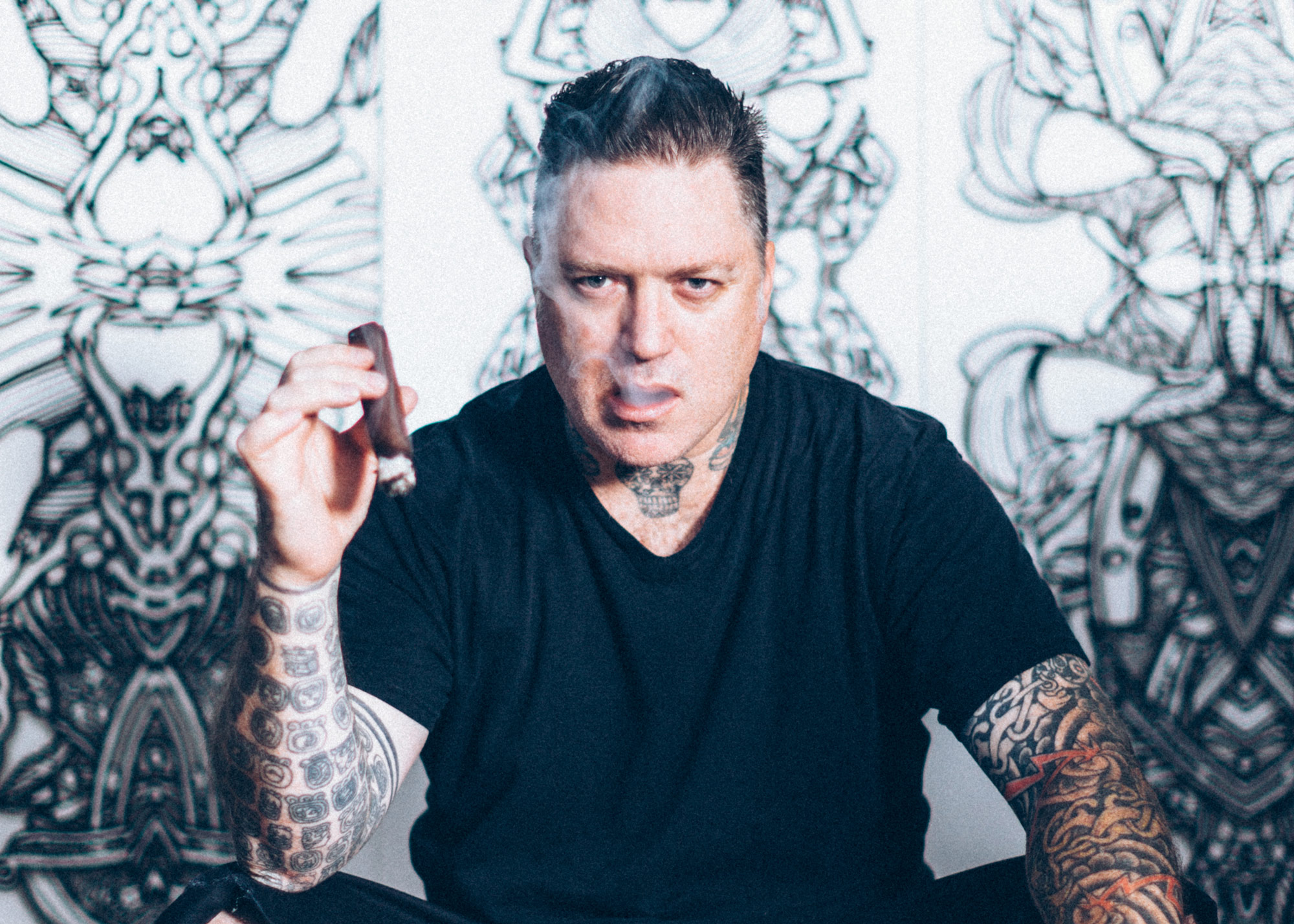
- Interview by Ryan & Tina Essmaker September 17, 2013
- Photo by Catalina Kulczar
Joshua Davis
- artist
- designer
- programmer
Joshua Davis is a New York-based artist, designer, and technologist who produces public and private work for companies, collectors, and institutions. His website, praystation.com, which he used to exhibit new design work and experiments using code, was one of the first to offer open source files for download. Joshua currently maintains an open source library for processing, HYPE framework, and speaks and leads workshops internationally.
Interview
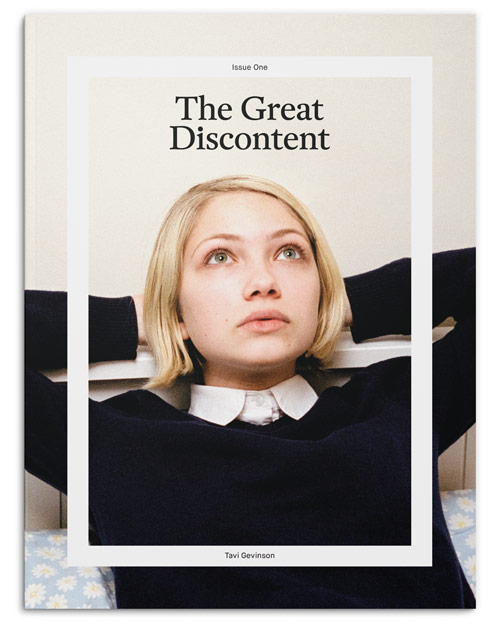 Editor’s note: An updated version of this interview, including new images and work, is featured in print in The Great Discontent, Issue One, available in our online shop.
Editor’s note: An updated version of this interview, including new images and work, is featured in print in The Great Discontent, Issue One, available in our online shop.
Describe your path to becoming an artist.
I was just a weird kid who did weird stuff. I recall going out on the playground at Catholic school and carving patterns in the dirt; I had a crazy imagination, and I was convinced I had discovered dinosaur bones. All the other kids were doing stupid shit, like playing soccer or kickball, but I was the youngest archaeologist I knew. (laughing) The nuns called my parents saying that I had a knack for being creative, and that they should nurture it. That was really odd for them to hear, because art was not part of the equation. My dad was literally a rocket scientist—at the time, he was doing stuff for Martin Marietta and building stuff for NASA. Culturally, my parents tried to enrich me anyway, as much as they could. I remember being in the second grade and getting an oil painting set! (laughing) There I was, 10 years old, cleaning brushes with turpentine! From then on, there was never any instance of, “I’m going to be a fireman!” No—fuck that. Art had defined me.
I continued making art and got really into skateboarding and 80s punk music in high school. Those two things really exposed me to DIY culture: You want a half-pipe? Then build a half-pipe. No one’s going to do it for you. That philosophy was a big part of how I became the content creator that I am today.
After graduating, I entered a state-wide painting competition and took second place in my home state of Colorado. I thought I was hot shit, and I was so convinced I was the next big thing that I decided to move to New York. (laughing) I bought a one-way ticket in November of 1992, right after I turned 21. I didn’t know a single soul out there, but I rolled up on Manhattan with three boxes and about $300 in my pocket. I don’t know if I was delusional or what—I mean, who the fuck does that? I thought I had arrived. (laughing)
That first night in New York, I hooked up with a dude who took me to a drag show in the East Village where I saw a 7-foot-tall black man dressed as Diana Ross. I ended up working at Disco 2000 at the Limelight, and I actually became a club kid for Michael Alig. I got paid to party with people: that was my job. (laughing) That lifestyle fueled my love of Warhol, the Factory, and Edie Sedgwick. I spent that first year meeting people at clubs and sleeping on people’s floors. That lifestyle was how my addiction really took off. I would start a typical night with alcohol, move into cocaine, and then take ecstasy. Then, as soon as I peaked, I would do horse tranquilizers—Special K. At the end of the night, I’d have to do heroin so I could go to sleep!
That’s a long-ass night!
Yeah, I had this crazy regime of peaks and drops, freak-outs, and K-holes. Then, around 1993 or ‘94, a bad spell of heroin called “China White” shot through Manhattan and killed 13 people. One of those people was a friend of mine, who died in my apartment. All I could think at the time, though, was how pissed off I was that he had fucked up my high—not that this person had just died in my bathroom, but that he had ruined my night. That was the beginning of the end. I had lost touch with the reason I came to New York in the first place: to be an artist.
Everything spiraled out of control after that. I got evicted from my apartment because I stopped paying rent. At one point, I got so high that I was hit by a cab and crushed my left knee. For the next three months I was homeless, sleeping on the streets. In the end, I lost everything I had: money, possessions, hope—my entire life. The whole time I kept thinking, “How did all of this get out of control so quickly?”
“In the end, I lost everything I had: money, possessions, hope—my entire life. The whole time I kept thinking, ‘How did all of this get out of control so quickly?’”
What did you do?
In retrospect, it was kind of nice that I had lost everything, because it meant that I could start over and be anything. Being able to completely walk away from who I was gave me the ambition and determination I needed to become the person I wanted to be. I got sober, and found an apartment in Williamsburg. My rent was $600, and I had the top floor of a building with a beautiful view of Manhattan. At that time, though, it was basically hookers and burned-out cars—not a good place to live. (laughing) But it was the only place I could afford.
I needed time to get back on track, so I decided to study painting at the Pratt Institute for a while. I don’t know if they really taught me anything, but they provided me with time to figure out who I was, artistically. I went through a phase of studying old Dutch masters, buying pigments from Amsterdam, and mixing my own oil paint. It was the dumbest thing in the world. (laughing) I just thought, “Why the fuck am I doing this? I’m painting like a bunch of dead assholes from the 15th century!” It had been done before. I was really concerned that the art world was a place where I could never do anything new, so I switched my major to communication design. I told myself I was going to do illustration; that way, I would still be able to paint, but it would be for “the man.” I started doing graphic design, advertising, and typography; but this was before computers, so I had to fucking draw Bodoni by hand and it was painful because my type teacher was a Nazi, and—(laughing)—it was hardcore, but I don’t regret anything.
At one point, I started collecting children’s books because I have a lot of respect for the illustration. It’s the hardest thing to do: you have to speak to an audience that doesn’t understand very big words and you have to represent everything visually so that they get the story. It’s the ultimate challenge, in my opinion, and I decided to put together my own story. I made up some characters in a scenario and illustrated it. I sent it off to two publishers, and just waited for the phone call—as if I was some fucking artistic genius. (laughing) I think Chronicle Books in San Francisco was one of the publishers who turned me down. I still have a beautiful card from them that basically says, “We regret to inform you that we have no idea who the fuck you are.”
(all laughing)
I was totally naïve—I knew nothing about the industry. I went into school the next day and said to a buddy of mine, “I don’t know what to do. I thought this was how it worked.” I thought I just had to be amazing and once everyone knew I was amazing, they’d come knocking on my door. He said that it didn’t work that way, and I replied, “That’s too bad, because I just put all these books together.” He looked at me and said, “Books?! Fuck books, man. Books are dead!” This was 1995. (laughing) He told me that there was a thing called the Internet, and everything was going to be online now.
So I went and got a thick-ass book that had a title like Writing HTML and JavaScript for Netscape 2. (laughing) I read it from cover to cover, but I didn’t have a clue what I had just read. Somebody had given me an old 386 computer and a monitor that wasn’t even color. I had no idea how to use it. I ended up finding out about a thing called Linux in the back of a book and, little did I know, I was about to embark on learning the world’s hardest operating system.
It was around that time that I started running out of money. The loans I had taken out weren’t enough to support going to school and paying rent. I had all my utilities turned off, and I was jacking the electricity from a lightbulb in the hallway: I had rigged an extension cord to a lightbulb with a plug. I was eating Top Ramen without even cooking it—I would just eat the noodle brick out of the package. (laughing) I did that for about a year and, emotionally, I was pretty beaten.
I went to Pratt and told them I couldn’t afford to keep going to school, and they suggested I get a job. They told me that the highest-paying job on campus was working for pratt.edu, and asked me if I knew how to build web pages. I had just read that HTML book from cover to cover, but did I know how to build web pages? No. So what did I say? “Yes!”
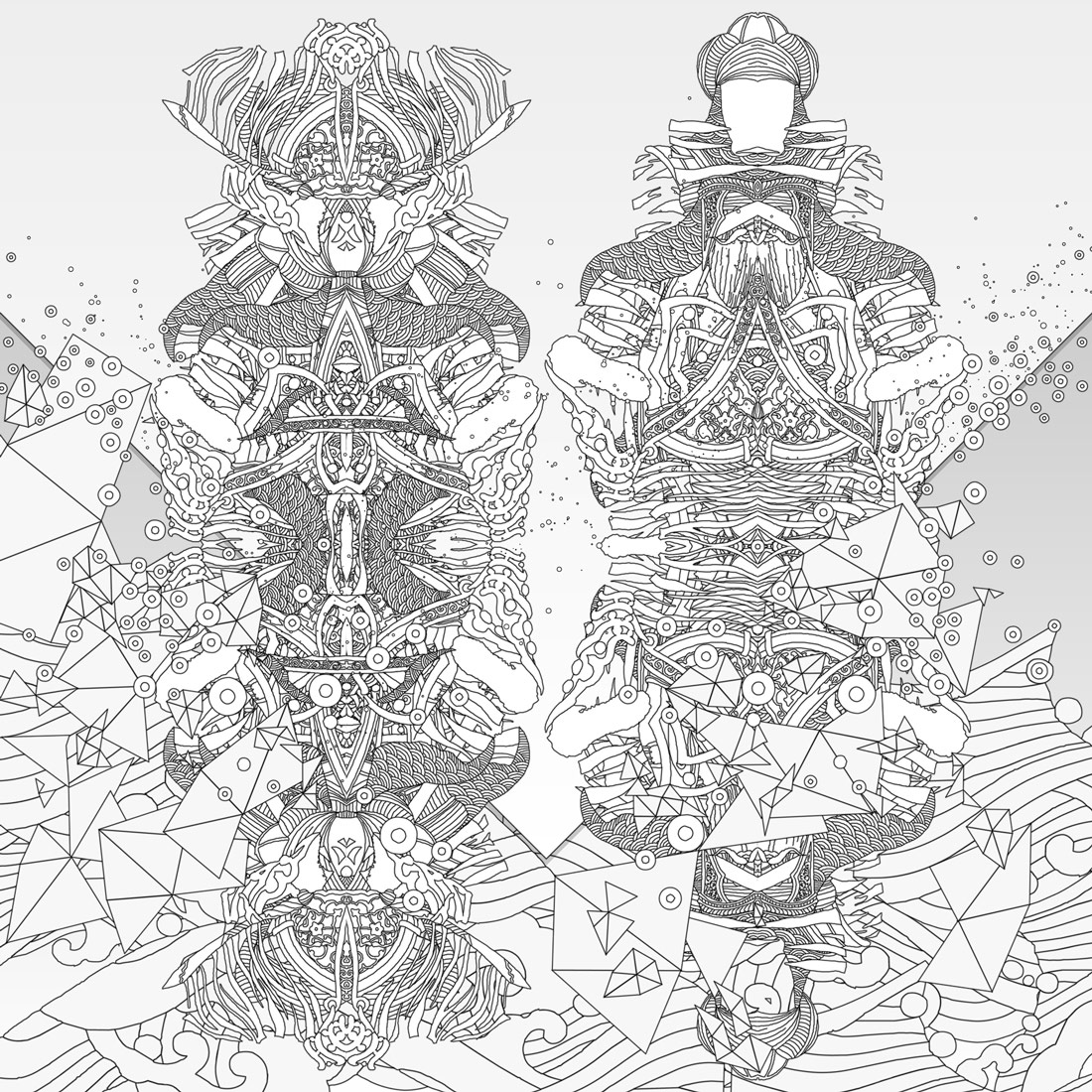
“I think if people know too much about their own industries, then they’re ultimately too influenced by it: either they won’t try things because people have already done them, or they just get focused on what the trends are instead of defining them.”
Was there an “aha” moment when you realized that web design was what you wanted to do?
There was never this “aha” moment; it was just blindly doing stuff. There were maybe eight of us designers on the entire Internet, so not much art was happening.
Around 1998, I bought my first domain, called praystation.com. I was stoked! I slowly progressed and became more aware of design; I sort of realized who I was and what I was doing, without even knowing I was doing it. There was just a moment when I thought, “I’m a computer artist now! When did that happen?” I had finally found the new form of expression I had been looking for: I was going to use technology to make art. I taught myself programming, and I was going to use it as a totally new form of art that had never existed in the history of mankind. Yay!
(all laughing)
Ryan: Were Flash and ActionScript the platforms you were using at that point?
Yes, but I moved on. I haven’t used Flash in almost two years, but I was an early adopter of it before it was even called that—it used to be FutureSplash Animator.
It’s interesting, because Flash would become both my success and my downfall. I hated the fact that I always got associated with it. I found that you were always associated with the technology you used, and that bothered me for years. We were just about ideas, and the tools that helped us execute those ideas were secondary to the ideas themselves. What was nice about Flash was that it was a scripting language with a vector-based environment. I liked the idea that I could edit things on the fly. There were more possibilities with illustration than there was with Photoshop.
The underlying theme was that I could harness my new powers of programming with having done art my entire life, and tie those two together. I could write a program that dipped into the drawings I made and randomly generate some impossible structure that would take me a lifetime if I had to do it manually.
What are you up to right now?
Well, I sort of hit a ceiling with Flash, so I made the jump to Java just so that I could do more. About a year ago, I started working in an environment called Processing. I’m working on a project called the Hype Framework. It’s basically a collection of actions that perform greater actions. I have things that do swarm behaviors, hit detection, oscillation—it’s like a toolkit. Here’s a good analogy: when you launch Photoshop, it isn’t just a pencil tool and a layers file. There’s a toolbar that performs certain actions. The Hype Framework is like that toolbar, and it helps me select certain actions, which are tied to my imagination.
“There are still people who make a lot more money than I do—but I get to do the types of things that I like doing. Somebody probably works in an advertising agency and makes a fuck-load of money, but they probably hate the work that they do.”
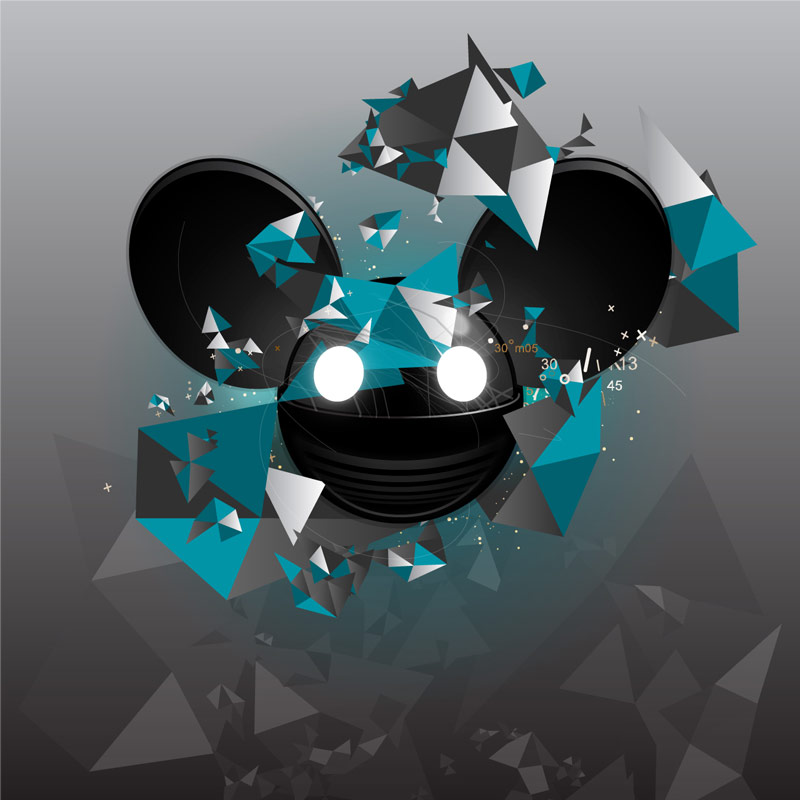
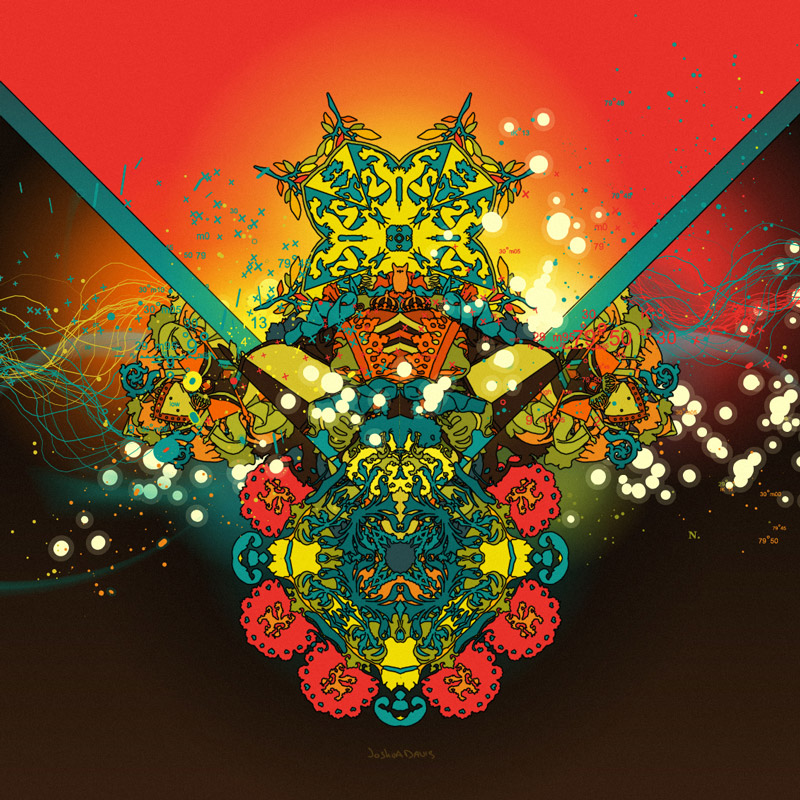
Have you had any mentors along the way?
When I got the job for Pratt’s first website, one of the guys I worked with was Thomas Noller. Thomas showed me everything about the industry, and set me on my path. He told me about HTML, JavaScript, Perl, and Photoshop. Without him, I wouldn’t be here today.
To be totally honest, though, I think the people who I’ve admired the most have nothing to do with the industry I’m in. I love people like Ayn Rand, Thomas Edison, and Napoleon Hill: people who have amplified the human spirit.
I try to stay away from my industry. I think the less I know about it, the more possibilities there are—I’m in a better position to invent or try something unique that way. I have two magazine subscriptions: Thrasher and Maxim. That’s about as deep as I go. (laughing) I think if people know too much about their own industries, then they’re ultimately too influenced by it: either they won’t try things because people have already done them, or they just get focused on what the trends are instead of defining them.
Has there been a point in your life when you’ve taken a big risk to move forward?
Yeah. I used to work for a studio called Kioken. I would work eight hours during the day there, then come home and work another eight hours on my own stuff. I remember getting an email from Volkswagon, and they asked me if I wanted to do a project for their new luxury car, the Phaeton. The budget was $50,000—I was making double that at the studio that I was working for. There was a moment when I thought, “There are some people who live for a year on that kind of money.” I decided to leave my job and go it alone. I was going to get this one job, and then I wouldn’t have to work for a year. I took that risk of going out on my own, and that was 10 years ago. (laughing)
Around that same time, I started getting asked to speak at conferences. I was traveling to one or two countries a month giving lectures. At one point, I was looking out at all these people in the audience, and I had a realization: I was pretty sure that almost everybody in the audience made more money than I did. I was barely getting by, going from job to job. I thought, “If all of these people are here to see me speak, and they’re making more money than me, then I’m doing something wrong.” I was just a bad businessman; I wasn’t selling myself well or commanding really great fees. For instance, I did a bunch of stuff for Nokia, and they said, “Hey, we’ve got a project for you, but the budget is only $10,000.” And I’d be like, “It’s cool, man!” I was really just living project to project, and not making a lot of money.
Two things happened after that realization. The first was when I confided in Stefan Sagmeister at a conference. I said to him, “Hey man, I think everybody in the audience makes more money than I do.” Then he told me, “Well, they should make more money than you.” I said, “Wait, really?” He replied, “Yeah, because they have shit jobs.” He said they should be paid more because they’re hurting; they’re not who they really want to be. He said I was going to make less money, but I got to be me, which is more exciting. There I was, thinking Stefan was going to give me words of wisdom, or tell me how to make a million dollars, but all I could think was, “Fuck, that’s not the answer I wanted to hear!” (laughing) So I stepped away from my ego a little more and realized that I get paid to make things I would just make anyway, so I should just shut the fuck up. (laughing)
The second thing that happened when I read Think and Grow Rich by Napoleon Hill. It’s full of interviews with America’s wealthiest people from that time, and looks for the common threads between them. There were some really great lessons in that book. One of them was, “Assess self-worth.” That meant sitting down and figuring out who you are in the industry that you work in; attaching a number to that; and being willing to do the work for that number. After I read that, I decided that that was what I was going to do. I thought, “I think I’m worth more than $5,000. In fact, I’m worth $50,000.” People would call, saying they only had a budget of $10,000, and I would tell them I didn’t do anything under $50,000. At the time, I remember thinking, “Holy shit! I can’t believe I just told them that! Am I crazy?” (laughing) This went on for three months, and at the end, I had six dollars. I was still getting invited to speak all over the world, doing design conferences, and feeling like I was on top of the world, but I only had six bucks. (laughing)
It got to the point where I had to borrow money from my wife’s parents to pay our mortgage, but I believed in what I read with all my heart. What I didn’t realize was that I was telling the industry for three months that they couldn’t hire me unless it was over $50,000. The next job I did was $120,000, then $70,000, then $90,000. That was a really important lesson, because a lot of creatives who are super talented undersell themselves. I’m not saying you should make crazy money—I still speak at conferences, and there are still people in the audience who make a lot more money than I do—but I get to do the types of things that I like doing. Somebody probably works in an advertising agency and makes a fuck-load of money, but they probably hate the work that they do.
Are your family and friends supportive of what you do?
I don’t think they really know what I do. (laughing) I was waiting outside of a place with my family, and this guy came up to me and said he was a huge fan of my work, and we ended up talking. The guy asked if he could get a picture with me, and my in-laws were caught off guard. I think they know that I have 27,000 followers on Twitter, but to them, I’m just Josh. I’m the guy who comes over on Sunday and eats pasta. I’m usually an idiot most of the time; I like to smoke cigars; I skateboard, and I tear through the neighborhood on my Harley really loudly—I’m that guy to them. They’re not clueless, but they’re always shocked when these kinds of things happen.

“I have a compulsion to make things and release them out into the world, but I don’t ever think, ‘I’m supposed to be doing this.’ One thing that I’m good at is not thinking too much. (laughing) If I did that, nothing would ever happen.”
Do you feel a responsibility to contribute to something bigger than yourself?
I am never conscious or thinking about contributing to something bigger than myself, but I’m a lover of open source. I love giving stuff away. I like it because that’s just what DIY culture tells us. It’s about freedom of knowledge: I truly believe that, as humans, we have more to gain by sharing what we know than trying to profit and hoard it.
Wanting to contribute to something bigger than myself is never something that has ever crossed my mind. It’s like asking me about my tattoos: “Aren’t you going to regret having those 20 years from now?” I don’t ever think about the ramifications to my decisions. I have a compulsion to make things and release them out into the world, but I don’t ever think, “I’m supposed to be doing this.” One thing that I’m good at is not thinking too much. (laughing) If I did that, nothing would ever happen.
Are you creatively satisfied?
No, never. I don’t think I ever have been, and isn’t that great? If I was, then I’d be done. It’s kind of a blessing and a curse. When I look back on all my work, I think, “If I knew then what I know now, I would have done things differently.” Nothing’s ever finished, or satisfying—I think that’s why I keep doing this. I never create things with the thought that I will reach some holy land of enlightenment; it’s very clear that I’m on a path with no end. My job is just to think creatively, make things, and put them out into the world. I will always be critical of the things I put out; I will always learn something six months later that tempts me to go back and change the fuck-ups I made. But that’s the journey.
What advice would you give to a young person starting out?
The best advice is not to listen to advice. Everybody has to find their own path, and who knows that path better than you? I think people can share their experience, strength, and hope—people can read this interview and learn about all the things I went through. But I’m not suggesting someone should go do heroin, become homeless, and then get sober. That’s just what worked for me. (laughing) I think what people will find is that they’ll figure out what to do on their own.
However, one thing that I would add to that is that you need to get out of your own way. We all have an enemy. There’s somebody out there who wants to stop you from getting where you want to get to, and that enemy is yourself. I’m amazed with people who meet me for the first time, and how the conversation is always instantly negative. They’ll say things like, “I could never do what you do,” or “I wish I could do that.” When people say that, they’re absolutely right. You will never be what you need to be because you’re already throwing up all these roadblocks. I had to learn how to get out of my own way when I put up my own roadblocks, like, “I don’t have enough money,” or “I don’t use the right color of blue”. There will always be some kind of excuse to justify to yourself why you can’t achieve greatness. You can look to other people to help you push forward, but whatever you’re reading really only pertains to that person. You’ve got to figure out your own shit—but in figuring out your own shit, you’re going to fuck it up by saying that you can’t do things. It’s amazing how many people deny themselves success.
How does where you live impact your creativity?
It doesn’t at all. Traveling is everything for me. That’s why I do lectures around the world—I like being dropped off in some country where I don’t speak the language or know about the culture. For example, I’ve been to Japan a few times, and I remember freaking the fuck out. (laughing) I would go to these temples and think, “Wow, this is perfect design.” Seven thousand years of culture! They’ve had some time to figure shit out. Years of refinement and trimming away the excess—it’s the ultimate in efficiency. It’s almost the ultimate in beauty too, because they have removed everything that is unnecessary. I remember just being floored by the detail and the craftsmanship, and being really inspired by Japan. I went home thinking, “I am going to steal the fuck out of everything that I just experienced.” I was living in that moment with all the textures, colors, feelings, and ideas. I started making stuff and putting it online, and a couple months later, I got an email from some people in Japan. They invited me to come and give a talk. (laughing) I realized that I was going to Japan to lecture about a culture that they didn’t see. When I went there, I was responding to an environment with completely fresh eyes, but because they lived in that environment, it was invisible.
That’s why my environment at home is almost the worst place for me creatively. In New York, I’m constantly having to remind myself of what’s visible. When I travel, everything’s amplified because I’m seeing the visible. People almost become complacent about beauty because they’re constantly seeing it.
Is it important to you to be a part of a creative community?
I don’t know if I’ve ever really thought about that, but I would say no. I like the industry I’m in, but I don’t know if I necessarily like hanging out with the people in my industry—they always want to talk about the industry. (laughing) The farther I can be removed from it, the more things become possible. I love the work I do, but I just don’t want to meet at a bar and talk about it. Teaching classes is different. I love teaching and doing workshops; I love working one-on-one with people and telling them how to do stuff. But do I want to get together with coworkers and talk about the latest JavaScript library? Not going to happen. (laughing)
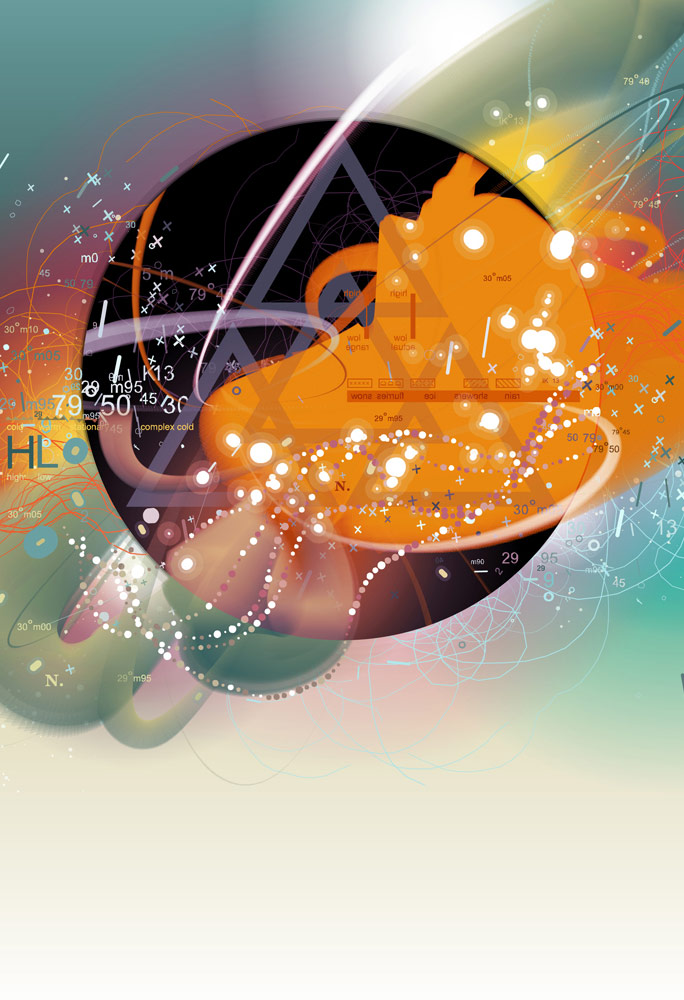
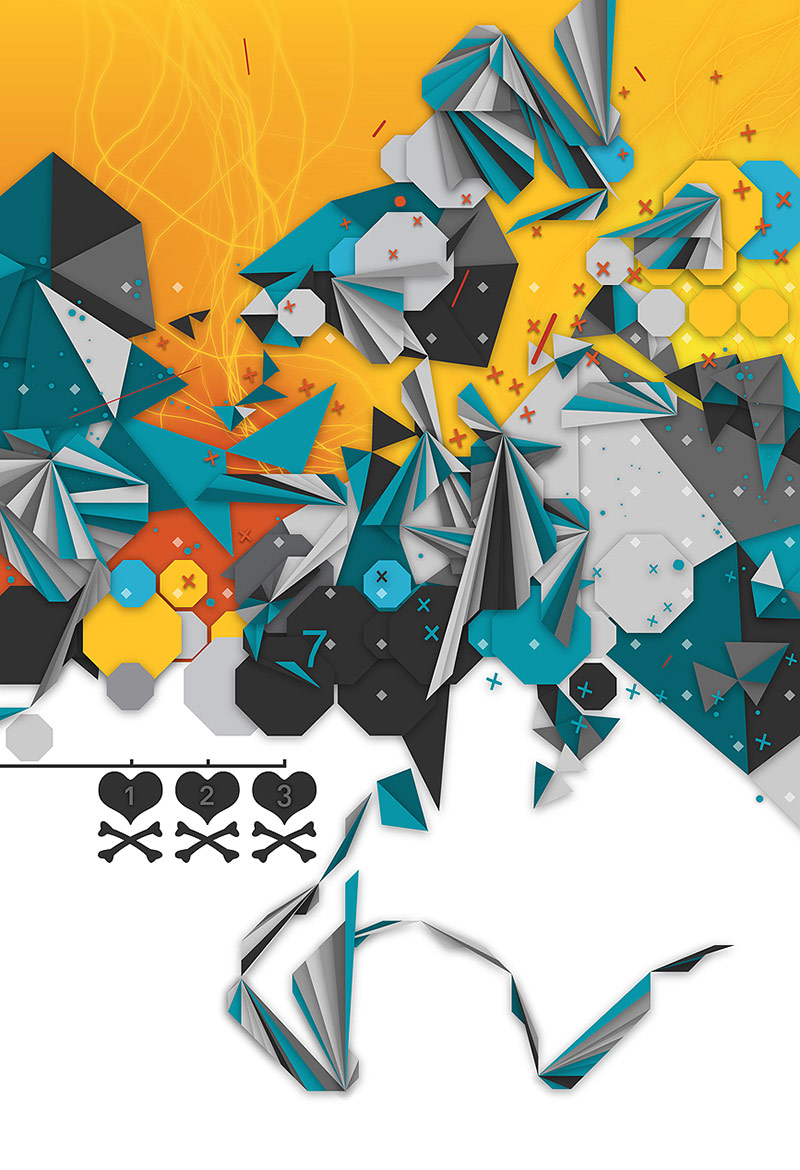
What does a typical day look like for you?
I used to be kind of a night owl, sometimes working until 4am. I live on Long Island, and from 2am to 4am it gets really quiet. I’d imagine a stillness, and picture myself zooming out above the city and seeing everybody asleep. “But there’s a light on! And there’s ol’ Josh Davis, conjuring dark magic while the world sleeps!” (laughing)
A couple of things in my life suffered from that, though. I was in this routine where I’d wake up at 2pm, and my daughter would get home from school at 3pm—I was a 42-year-old vampire! I had to change that. Now, I wake up at 7am and have breakfast with my wife and daughter. From 9am to 6pm, I think of stuff to make. Later in the evening, I go back to work and am usually up until midnight making stuff. On the weekends: skateboarding and motorcycles.
What is your current album on repeat?
My favorite music right now is atmospheric stuff, like soundtracks for movies. Lustmord makes me feel like I’m floating in outer space, and I really like the new Hecq album, Horror Vacui. I have a Tumblr site at praystation.tumblr.com where I listen to music, and then write black-and-white programs based on what I listen to.
Do you have any favorite movies or TV shows?
I’m not a television guy. TV is a passive experience that I can’t hang with. I have no idea what’s on or what shows are cool, but I recently watched Game of Thrones, because who doesn’t like sex and violence? (laughing)
As for favorite movies, I would say The City of Lost Children. But now I’m really getting into documentaries, which is upsetting—does that mean I’m getting old? (laughing) I really like The Five Obstructions, which is about Lars von Trier, and Bob Marley’s documentary, Marley, is fucking excellent. I really liked Room 237, which documents all the theories about the movie The Shining. I worship Kubrick for his attention to detail.
Do you have a favorite book?
Ayn Rand’s The Fountainhead is a tough one to get through, but I like it because the main character, Howard Rourke, is impossible. He’s the thing that everyone wishes they could be: not affected by criticism and having a blinding truth of what you know is the best. Like I mentioned before, Think and Grow Rich by Napoleon Hill was a really important book for me. I really like Paulo Coelho’s The Alchemist. It’s about knowing your path, being on it, and realizing that time takes time. Some people might be on their path and want things too quickly, but it’s not their time yet; some people don’t even know they’re on a path. (laughing) It’s being aware of where you’re going and how you’re getting there.
Do you have any favorite food?
Japanese soba noodles are pretty high up there. I always fantasize about eating at Cocoron by the Williamsburg bridge. (laughing)
What kind of legacy do you hope to leave?
I think if you care about leaving some kind of legacy, then maybe the work that you’re doing isn’t truthful. I’m not going to say any names, but there’s a dude out there who’s always talking about how is his work will be archived and treated after he’s gone, and I’m thinking to myself, “Fuck off!” I can’t honestly answer this question because if I’m thinking that much about my work, I should probably shut the fuck up. People like Steve Jobs, Thomas Edison, Einstein, and Tesla never sat around and thought about what kind of legacy they were leaving. They had a passion to make things happen, regardless of what the outcomes were. I’m not lumping myself in here, but no genius thinks about how much of a genius they are. Legacy is for others to decide. You should just shut the fuck up and make stuff—if a legacy happens, then it’s just sprinkles on the ice cream.
A friend of mine was asked to photograph Takashi Murakami. He went to Japan to his place, a big warehouse with all these assistants that are making his work. My buddy David said, “We’ll shoot some photos here, and when we’re done, we’ll go back to your apartment and shoot some stuff there.” Takashi said, “There is no home. There’s just the studio.” David says, “What do you mean? Where do you sleep?” And Takashi replied that he sometimes sleeps on his desk or his hotels. There was no girlfriend or wife, and no home—only his work. I don’t know if this guy is just acutely aware of his own mortality, but he explained that there’s not enough time on earth for him to get out all of the things that are in his head. As crazy as I thought that was, part of me gets it.
Sobriety has taught me to take things one day at a time. If you just live in the moment and aren’t concerned about those kinds of answers, then your legacy will either reveal itself or it won’t. I wake up every day astonished at life, and getting a second chance. I’m a lucky motherfucker.
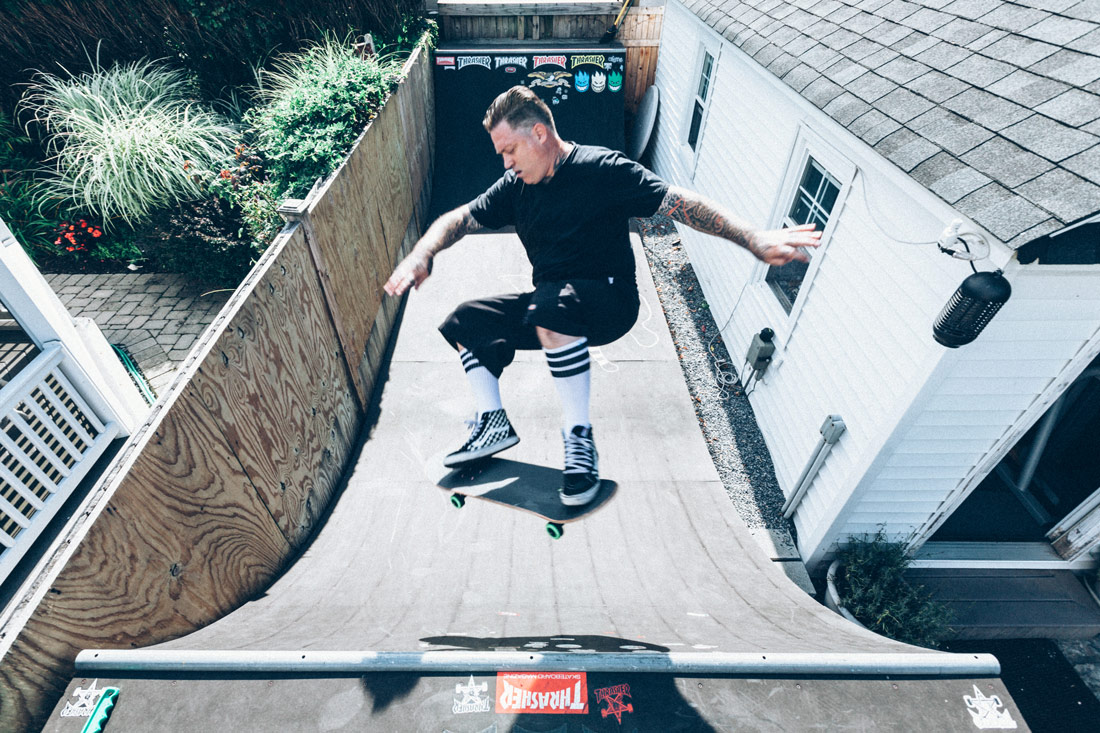
“I think if you care about leaving some kind of legacy, then maybe the work that you’re doing isn’t truthful. Legacy is for others to decide. You should just shut the fuck up and make stuff—if a legacy happens, then it’s just sprinkles on the ice cream.”
